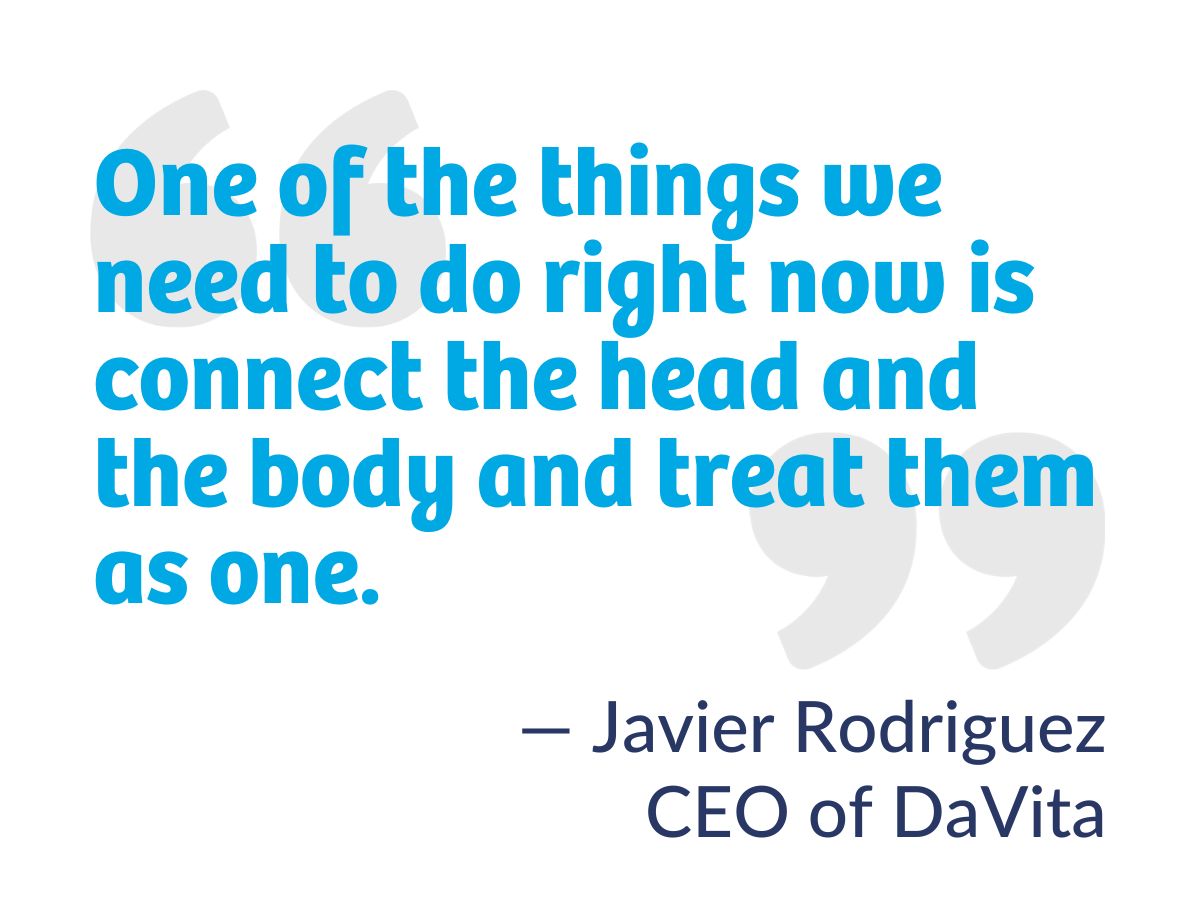
Last month, DaVita CEO Javier Rodriguez joined a panel at the annual HLTH conference to discuss the topic, “What’s Plaguing Our Health.” The conversation, moderated by A.G. Breitenstein, spanned topics including mental health, emerging technology and efficiency of the health care community.
Rodriguez was joined by Greg Meyers of Bristol Myers Squibb, Paul King of Stanford Children’s Health and Dr. Vivian Lee of Verily Health Platforms.
Breitenstein opened the conversation citing that the pandemic is attributed with a 27.6% rise in major depressive disorders and a 25.6% rise in anxiety disorders. The panel agreed: The health care community needs to see mental health as a crucial element of total health.
“Historically, mental health has been carved out of the insurance system and isolated in terms of its impact on medical spend,” Rodriguez commented. “It should be at the forefront of the new front door of primary care and medicine generally.”
The DaVita CEO cited that the shift in health care to integrated care models focused on holistic care or “human care” can help the health care system start emphasizing the need for mental health services—but Rodriguez also thinks more work needs to be done:
“The health care system continues to say, ‘Why don’t you take this part, this part—and then at the end, we’ll see about the savings,’” Rodriguez said. “One of the things we need to do right now is connect the head and the body and treat them as one.”
As the conversation turned toward opportunities to leverage new technologies and data, Rodriguez agreed with the panelists that emerging technologies have the opportunity to empower daily health management, but at the end of the day, people with kidney disease often have multiple comorbid conditions and need to have access to physicians. Building on this, he emphasized the integral role nurses and other health care workers play in patient care.
“70,000 people in the U.S. got turned down from nursing school this year—70,000 people,” Rodriguez said as he explained the need to consider how to make health care careers more accessible during a time when the entire health care community experiences staffing challenges. He also explained that at DaVita, the goal is to create an employment experience where teammates (DaVita employees) have access to resources that support economic mobility, education and career growth—with a long-term perspective.
“It’s okay to not be okay.”
In talking about his approach to mental health and well-being during the pandemic, Rodriguez explained he focuses on DaVita teammates. Front-line health care workers across the country showed up every day in ever-changing and stressful conditions to deliver life-sustaining care for patients. So, Rodriguez says he invests his energy in making sure those teams have the support they need and continuously asking the question, “How can we support our teammates in a stronger way and become a destination where people go and feel more support than ever?”
It also means being vulnerable. Leading by example, Rodriguez explained, includes sharing his own personal stories with teammates at DaVita and creating space for other executives to share what’s going on in their own lives, too.
Rodriguez said the goal is to destigmatize discussing mental health needs and remind the teams he leads: “It’s okay to not be okay.”









